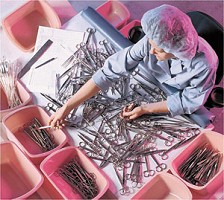Recycling boosts Iowa Health’s bottom line

Hospitals have reused surgical tools such as drill bits, saw blades and tourniquets for decades.
And though it may not be the first thing that comes to mind when considering health care, the reprocessing of medical supplies has provided a shot in the arm to the state’s largest health-care organization.
In the past three years, Iowa Health System has saved nearly $2 million and diverted more than 84,000 pounds of waste from entering landfills through three medical device reprocessing programs.
The nonprofit organization, which under its umbrella has 25 hospitals, nearly 20,000 employees and more than 140 physician clinics, implemented the initiatives as part of an overall plan to reduce its carbon footprint.
Fourteen of Iowa Health’s senior-affiliate hospitals – including Iowa Methodist Medical Center, Blank Children’s Hospital, Iowa Lutheran Hospital and Methodist West Hospital in Greater Des Moines – have embraced one or more of the programs, and smaller rural hospitals are starting to come on line.
“We’re avoiding all those one-time-use landfill products,” said Connie Boss, director of surgical services contracting with Iowa Health. “We send them to someone who will remanufacture them and sell them back to us at a significant savings.”
In October, the Iowa Recycling Association recognized Iowa Health by presenting it with the Murray J. Fox Recycling Innovation Award, which is intended to acknowledge businesses and other organizations that develop, manufacture and market sustainable products.
Boss, a 29-year Iowa Health clinician who spent the first five years of her career working in operating rooms, said educating Iowa Health’s administrators, physicians and employees about the benefits of repurposing medical equipment has helped the programs take root.
Her department also has buy-in from the organization’s CEO and board of directors, who she said are equally concerned with environmental stewardship as they are with saving money.
“The more we reprocess, the more our capital bill for brand-new technology is forgiven,” Boss said, giving as an example the recycling of Nellcor pulse oximetry sensors, medical devices that are used to measure blood-oxygen levels.
Through that program, Iowa Health has saved $57,000 since September 2009.
First, hospitals ship used sensors to Monterey, Calif.-based Sensortech Services LLC, which sorts, counts, inspects, cleans and repackages them.
“Sensortech credits our account with Nellcor depending on the number of our sensors eligible for remanufacturing,” Iowa Health said in its self-nomination for the Murray award. “We are then able to buy remanufactured sensors back from Nellcor at a reduced rate, up to the number of credits in our account.”
In 2008, Iowa Health partnered with Centurion Medical Products Corp., based in Williamston, Mich., to execute another recycling program that centers on small medical procedure trays and metal supplies used for procedures such as mending lacerations.
Hospitals send instruments such as suture sets to Centurion, which provides rebate dollars for those that can be remanufactured. Those that can’t be reused are recycled.
The rebates are used to buy new supplies, many of which are remanufactured themselves. Since October 2008, Iowa Health said that program has saved it more than $43,000.
“These dollars are given right back to the affiliates,” Boss said. “They prioritize what is important to them.”
Since 2007, Iowa Health has steadily increased its participation in its largest medical device reprocessing program, which was developed in coordination with Phoenix-based Ascent Healthcare Solutions Inc., an independent reprocessor of medical devices that works with well-known hospitals such as the Mayo Clinic.
The industry
In 2000, the U.S Food and Drug Administration (FDA) began regulating the practice of third-party medical device reprocessing, an industry that was born more than 20 years ago when original equipment manufacturers (OEMs) began placing “one-time use” labels on certain products.
“Hospitals always reused their own medical equipment, since the advent of medical devices,” said Daniel Vukelich, president of the Association of Medical Device Reprocessors, or AMDR, a trade organization that was formed in 1997 to represent the interests of the third-party reprocessing industry.
Vukelich, noting that the integration of plastics into medical instruments began to complicate the process of medical providers’ in-house sterilization procedures, said adding the single-use labels was a failed attempt by OEMs to artificially inflate their prices and cast doubt on the safety and effectiveness of reprocessed goods.
“But all of this stopped in 2000 with FDA’s regulations,” Vukelich said. “Basically, if it says ‘reusable,’ the hospital can reuse it. If it says ‘single-use,’ ‘disposable’ or isn’t marked, the hospital is supposed to throw it away, or send it to an FDA-regulated third-party reprocessor.”
According to Boss, not only does stringent FDA oversight require third-party processors to show that reprocessed devices either meet or exceed OEM standards, the work of companies such as Ascent leads to lower prices across the board.
“Because they got involved and made it a commodity product, everybody had to bring their prices down to be on an even playing field,” Boss said. “They are lowering costs of health care by making original manufacturers accountable. They are making the original manufacturers do better work.”
Iowa Health has shipped more than 77,000 pounds of contaminated supplies to Ascent’s facilities in Phoenix and Lakeland, Fla. Three percent of the materials sent to Ascent are reprocessed, meaning they are cleaned, inspected and sterilized but not taken apart; or remanufactured, meaning they are taken apart, cleaned, inspected, reassembled and sterilized.
That program has provided the biggest return on investment.
Many of the reprocessed devices are sold back to Iowa Health at a discounted price, saving the organization $1.85 million since 2007. The 97 percent of materials that can’t be reprocessed are recycled.
Boss said the sheer volume of single-use devices, such as trocars, which are used in minimally invasive laparoscopic surgeries, is what makes that program so profitable.
“With Ascent, it is invoice savings, which frees up their operating budget to do more with other things,” Boss said, such as reinvesting in the integrated health system’s work force and in new technologies.
The bottom line
More than 3,000 U.S. hospitals participate in third-party medical device reprocessing, which by the AMDR’s estimate has grown into a $200 million to $250 million a year industry that has helped eliminate more than 13,000 tons of waste from landfills and incinerators.
Vukelich said all 14 hospitals listed on U.S. News & World Reports’ 2010-11 list of “honor roll” institutions, as well as nine of that magazine’s top 10 orthopedic hospitals, participate in reprocessing programs.
And three health-care groups – HeathTrust Purchasing Group, MedAssets Inc. and Practice Greenhealth – have designated reprocessing as a best clinical practice.
“For me it fits very well with our mission of the best outcome for every patient, every time,” Boss said. “And how you get there is having the best products at the best price. The more you save, the more you free up, the more you can buy.”
“One of our mission statements for a great team or a great initiative is that we need to balance the environment and the economics of it,” said Lisa Campbell, a director at Iowa Health Consolidated Services who works with Boss to oversee the organization’s overall green initiatives. “We are equally as passionate about trying to take money out of health care as we are saving things out of the landfill,” she said.
According to an article posted on www.hospitalmanagment.net by business analyst Ashwin Mouduga, the global reprocessing industry was estimated to have generated more than $500 million in revenues in 2008. That figure is expected to grow at an annual rate of 12 percent to 14 percent in the next seven years.
“I think the general public’s perspective is that in health care you just throw everything away because it is contaminated or whatever the case may be,” said Laura Ippen, Iowa Health’s sustainability intern. “It’s not a typical recycling program, like plastic or paper, that people are used to hearing about.”
Approximately 95 percent of third-party reprocessing in the United States is performed by Ascent and Minneapolis-based SterilMed Inc.











